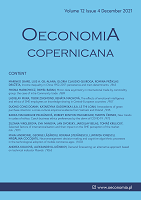Assessing the energy security of European countries in the resource and economic context
Assessing the energy security of European countries in the resource and economic context
Author(s): Izabela Jonek-KowalskaSubject(s): Energy and Environmental Studies, Security and defense, EU-Accession / EU-DEvelopment
Published by: Instytut Badań Gospodarczych
Keywords: energy sources and economic development; energy security; determinants of energy mixes;
Summary/Abstract: Research background: In recent years, much attention in the literature has been paid to the economic and environmental conditions of energy development as a key sector for the development of national economies. The issue of availability of individual energy resources and related energy security is receding into the background, most often due to the strong globalization of economies and the associated assumption of free international flow of goods and services, and thus practically unlimited possibilities of buying on the international commodity markets and energy exchanges. Nevertheless, the importance of energy security increases significantly in crisis situations. Purpose of the article: Bearing in mind the circumstances indicated above, the main objective of this article is to assess the energy security of European countries carried out in the context of resource and economic conditions. Methods: The article proposes its own methodological approach to the assessment of energy security based on the analysis of the energy mixes of 32 European countries and the availability of their own internal energy sources. In the process of classifying the studied economies into homogeneous groups in terms of resource and economic determinants (GDP per capita), principal component analysis was used. Findings & value added: The theoretical and methodological added value of the article results from the development of the author's approach to the assessment of energy security using individual and aggregated energy sufficiency index. Empirical added value is related to the results of energy security assessment in European countries, which can be used in shaping energy policies. Therefore, most of the 32 European countries assessed have a low level of energy security, which is due to the dominant use of non-renewable energy resources in their energy mixes. Countries with a high level of energy security have their own non-renewable resources or use alternative energy carriers in the form of renewable sources, hydropower or nuclear energy.
Journal: Oeconomia Copernicana
- Issue Year: 13/2022
- Issue No: 2
- Page Range: 301-334
- Page Count: 34
- Language: English

